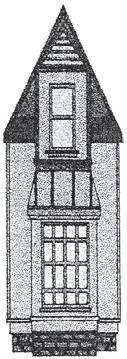
 DJ CYMBA INTERVIEW, POLICE DISTRICT COUNCIL RACES, HARPER THEATER AND MORE INSIDE
DJ CYMBA INTERVIEW, POLICE DISTRICT COUNCIL RACES, HARPER THEATER AND MORE INSIDE
What happened to the Tudor Gables housing cooperative?
The Castle on Drexel


 DJ CYMBA INTERVIEW, POLICE DISTRICT COUNCIL RACES, HARPER THEATER AND MORE INSIDE
DJ CYMBA INTERVIEW, POLICE DISTRICT COUNCIL RACES, HARPER THEATER AND MORE INSIDE
What happened to the Tudor Gables housing cooperative?
The Castle on Drexel
FR I, JAN 20 / 7:30 PM / PERFORMANCE
Join three celebrated artists on a journey into the human condition, illuminated by diverse storytelling styles alongside Blues music as a medium and entry point into the Black American musical genre and tradition. With music from traditional and contemporary instruments, spoken text, humor, sound essays, lyrical poetry, and more, this is a night audiences won’t soon forget.
TH U, FEB 23 / 6PM /
This investigation of Blues and Black rural identity, and the rich musical and visual cultures that stem from both, will challenge the invisibility of Black bodies in rural spaces. Our expert panel of scholars and artists curates an evening of Black rural culture through the intersecting lenses of Country Blues, Black Country Music and Visual Arts, and a trip into the heart of Black Appalachia.
SAT, APR 1 / 7:30 PM / PERFORMANCE
Blues Geographies with Corey Harris and James Leva, moderated by Matthew Skoller, will be an evening of performance, conversation, and delicious local BBQ. Tickets go on sale February 15.

logancenter. uchicago.edu
Logan Center for the Arts 915 E 60th St • Chicago loganUChicago
The Logan Center’s Blues programming is made possible with the generous support of The Jonathan Logan Family Foundation with additional support provided by the Chill Family Fund for the Logan Center for the Arts. Gaye Adegbalola. Photo: Marc Norberg.The South Side Weekly is an independent non-profit newspaper by and for the South Side of Chicago. We provide high-quality, critical arts and public interest coverage, and equip and develop journalists, artists, photographers, and mediamakers of all backgrounds.
Volume 10, Issue 8
Editor-in-Chief Jacqueline Serrato
Managing Editor Adam Przybyl
Senior Editors Martha Bayne Christopher Good Olivia Stovicek Sam Stecklow
Immigration Editor Alma Campos
Community Builder Chima Ikoro
Contributing Editors Jocelyn Vega Francisco Ramírez Pinedo Scott Pemberton
Visuals Editor Bridget Killian
Deputy Visuals Editor Shane Tolentino
Staff Illustrators Mell Montezuma Shane Tolentino
Director of Fact
Checking: Savannah Hugueley
Fact Checkers: Grace Del Vecchio, Kate Linderman, Zoe Pharo, Emily Soto
Layout Editor Tony Zralka
Special Projects Coordinator Malik Jackson
Managing Director Jason Schumer
Office Manager Mary Leonard
Advertising Manager Susan Malone
Webmaster Pat Sier
The Weekly is produced by a mostly all-volunteer editorial staff and seeks contributions from across the city. We publish online weekly and in print every other Thursday.
Send submissions, story ideas, comments, or questions to editor@southsideweekly.com or mail to:
South Side Weekly 6100 S. Blackstone Ave. Chicago, IL 60637
For advertising inquiries, please contact: Susan Malone (773) 358-3129 or email: malone@southsideweekly.com
For general inquiries, please call: (773) 643-8533
Hyundai and Kia have been in the spotlight in the past year for car thefts. Both companies continue to shell out budget cars that are susceptible to hotwiring, and encouraged by a new TikTok trend, the average person can easily learn how to commit grand theft auto while scrolling on social media. The trend involves stealing a car using a USB cord and other low technology methods. The victims of these thefts have often been left with cars that are completely totaled or damaged and in need of repair. However, with Kia and Hyundai parts in such high demand as a result, car shops in Chicago are becoming increasingly overwhelmed and unable to complete repairs for months as they wait for supplies. According to Cook County Sheriff Tom Dart who spoke to CNBC in September, thefts were up over 800% in the fall. If you own a Kia or Hyundai vehicle from the year 2010-2021, especially models that do not use a keyfob or push-to-start ignition and instead use a mechanical key, you are vulnerable to hotwiring. Steering wheel locks, including the old fashioned ones, can help protect your car from theft.
Homeowners will have an extra month to pay the first installment of their property tax bill after Governor J.B. Pritzker signed a bill last month moving the new due date to Monday, April 3. The first installment bills—which are fifty-five percent of all 2022 taxes—will be mailed out in late February or early March, and are already available at cookcountytreasurer.com. Cook County Treasurer Maria Pappas said this month delay will “give taxpayers some breathing room after Second Installment bills were late last year.” But this delay doesn’t fix the deeper burden of rising property taxes on homeowners and tenants. According to a recent report, homeowners’ property taxes increased by $330 million from 2020 to 2021, meaning more homeowners saw their tax bills go up than commercial property owners. Latinx homeowners in fast-gentrifying communities saw some of the highest hikes in their tax bills. In late December, Pilsen residents organized a car caravan ending at the Cook County building in the Loop. Hearing residents' concerns, 25th Ward Alderman Byron Sigcho-Lopez called for reforms, including late fee waivers and checking assessments for errors.
Nine mayoral candidates, including Mayor Lori Lightfoot, have confirmed their attendance to a candidate forum organized by the grassroots group, the People's Response Network. The forum will be hosted on Sunday, January 15, at Quinn Chapel AME Church, 2401 S. Wabash Ave., at 2:30 p.m. and will be livestreamed on ChicagoCornerTV.com. The topics of discussion will cover public housing, public schools, public health, public transportation, parks, environment and elected boards. Since November, three mayoral forums have been hosted—on the North Side. RSVP at bit.ly/PRNChiMayor
what happened to the tudor gables? After millions in loans were pumped into building rehab, a historic housing cooperative abruptly dissolved and sold last year. Former members still have questions for the board. emeline posner 4
the lemon pepper legend: an interview with dj cymba
Talking music and brotherhood with HUEY Gang’s event curator and DJ. kia smith and thoughtpoet ................. 9
harper theater to reopen after revamp Historic cinema, now under new ownership, to get ‘luxury’ facelift.
dierdre robinson .................................. 11
2023 voter guide to chicago’s police district council races
Three councilors will be elected to serve in each of the twenty-two police districts for four-year terms.
sky patterson and jim daley 13
the exchange
The Weekly’s poetry corner offers our thoughts in exchange for yours. chima ikoro, shivani kumar 20
public meetings report
A recap of select open meetings at the local, county, and state level. documenters and scott pemberton .. 23
by Bridget Killian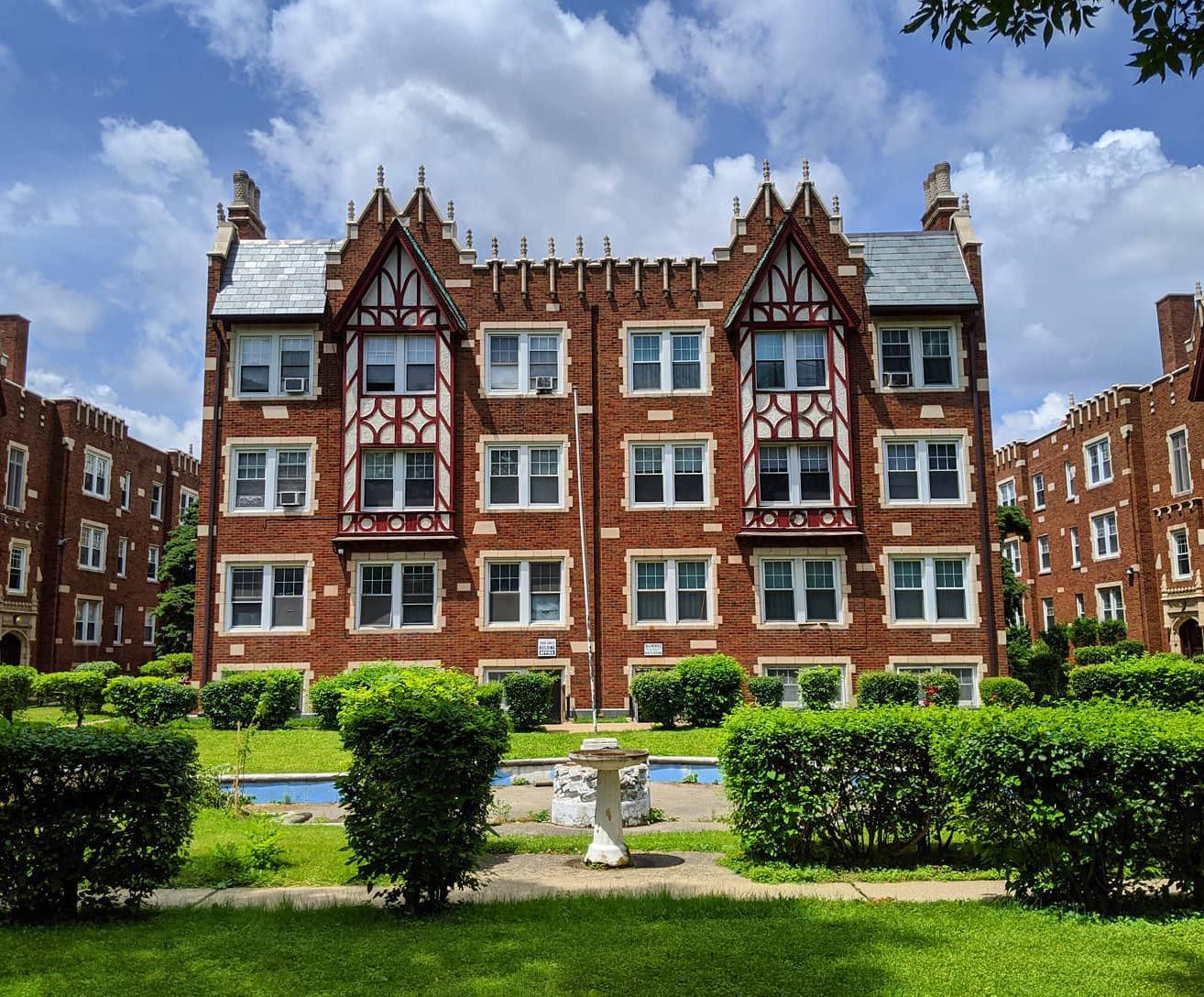 BY EMELINE POSNER
BY EMELINE POSNER
This is the first of three stories in the series “What happened to the Tudor Gables?“, profiling a historic Black-owned housing cooperative on Drexel Boulevard. In March 2021, after a $3.4 million rehab project, the cooperative abruptly dissolved and sold the building. The Herald/Weekly interviewed dozens of Tudor Gables shareholders, lawyers, contractors, and neighbors and reviewed hundreds of internal emails and public documents about the rich legacy of the “castle,” as members fondly referred to the building, the conflicts that led to its sale, and the changing face of the boulevard.
It was a hot Saturday afternoon in July 2017, and grills were smoking in the empty fountain pool in front of Kenwood’s Tudor Gables housing cooperative. Longtime member Cassandra Dixon was tending to chicken, rib tips, and hot dogs across five grills, while other members fussed over snacks and a custom sheet cake. The smell of it all was wafting into the windows of the building’s hundred-odd units and down the 4800 block of Drexel Boulevard.
Members emerging from the cooperative’s quarterly board meeting trickled down to eat and mingle, and building elders sat in the shade of a tent that Dixon and her mother, Gladys Means, had set up. Neighbors from down the block were stopping over, too. Hell, people no one from the Gables had ever
After millions in loans were pumped into building rehab, a historic housing cooperative abruptly dissolved and sold last year. Former members still have questions for the board.Tudor Gables in 2020, before being purchased by 312 Properties
seen were pulling up in cars on Drexel, saying they were stopping by to see a cousin, and could they please have a plate.
Dixon and Means would play a little—“So what’s your cousin’s name?”— before heaping up a plateful for them. “All you had to do was tell us you was hungry,” Dixon would say.
As the sun set over Drexel’s courtyard buildings and mansions, Dixon took a swig of her beer and looked around at the small crowd gathered in front of her lifelong home. A barbeque in front of the Gables, who would have thought? She shook her head and smiled. For as long as Dixon could remember, no one had been allowed to use the lawn—not for play, not for grilling.
Since Dixon was a child, the building elders had made a point of keeping the few kids who lived in the building off the lawn, lest they mess up the courtyard’s neat landscaping or get hurt playing in the fountain pool, which at one time was a neighborhood attraction, full of koi fish and wished-upon coins. The fountain went dry sometime in the 1990s, but the rule stuck, at least until this summer of 2017, when the president of the housing cooperative board approached Dixon and Means about hosting a buildingwide picnic. Though the two initially felt conflicted about upending building norms, they decided it was worth it. “This would be a good thing, show unity, bring everyone together ’cause it’s a hard time— let’s do this,” Dixon remembered saying.
Dixon and Means loved the Tudor Gables dearly, but it hadn’t been an easy place to live for some time.
In the mid-2000s, the roof of the grand Tudor Revival–style building had started to fail. With every rainfall and snowmelt, water trickled in through cracks in the mortar. The roof needed a full replacement; the board was only hiring contractors to do patch work. Residents did their best to manage the water on their own with buckets and tarps, but by 2012 as many as thirty units were marked with cracks, warped floors,
broken electrical outlets, and mold.
The board was mismanaging more than just repairs. An accountant brought in to audit the building’s 2007–2009 financial records could not verify any of the building’s books. In their report, the accountant highlighted a $50,000 debit from one of the co-op’s bank accounts that the board was either unable or unwilling to explain. “No records have been produced to show where the money went,” the accountant wrote. The board had also been lumping different cash flows together in a way that made it
impossible for an auditor to trace funds back to their source.
“There was no accountability for it,” Dixon said. She remembered the accountant warning members, “You need to start paying more attention to what’s going on.”
In the years leading up to 2012, some members stopped paying assessments. Some said they were assured that they wouldn’t need to pay until the roof had been repaired and they were no longer living with leaks. Others didn’t await permission and withheld their payments
in protest of the board’s nonaction.
The board’s main response to withheld assessments had been to take nonpaying members to evictions court. In the 116 eviction cases the board filed between 2000 and 2009, it sought back pay, the member’s shares in the cooperative, or both. Nearly two-thirds of these filings resulted in eviction orders.
The deluge of evictions tore at the social fabric of the cooperative while racking up legal fees for the board. “They kept burning off excess money going to court, going to court,” said William House, who had moved into the Gables in 1980. Between 2008 and 2011, House fought and settled two eviction suits by the board over his third-floor unit, which was so water-damaged that he withheld assessments and eventually lived outside the building for several years. “I did not feel like the building was being run right,” House said.
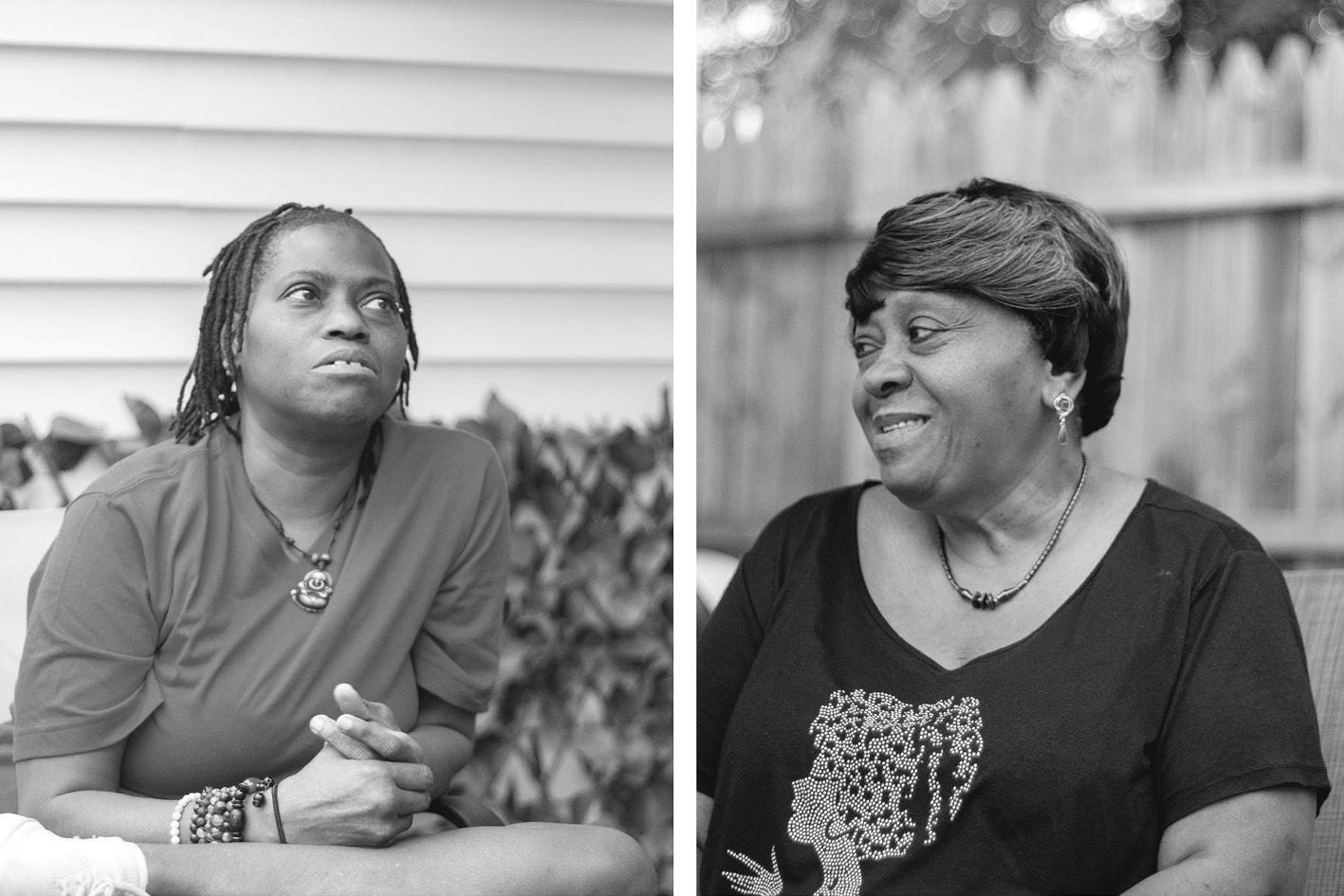
For some, the Gables’ problems became too much. Tired of dealing with water damage, drawn-out eviction battles, and an untrustworthy board, members began leaving the building. Some tried to sell their units while others simply abandoned them, compounding the cooperative’s cash flow problems.
But others were determined to find a path forward. For all its issues, the Tudor Gables was one of the most affordable unsubsidized housing options left in the area. With the cooperative’s low monthly assessments and small apartments, many older members, like House, could afford to live there on fixed incomes. Others were hopeful the Tudor Gables could return to better times.
Dixon in particular recalled the building of her childhood and early adulthood with fondness and pride. “It was a proud moment living on the boulevard, living at Tudor Gables,” Dixon said. “You was happy when your friends came, your family came, and saw this castle. And that’s what everybody called it. ‘You live in the castle on Drexel?’ ‘Yup.’ ‘With the white fountain in front?’ ‘Yup, with the white fountain in front.’”
“It was a proud moment living on the boulevard, living at Tudor Gables. You was happy when your friends came, your family came, and saw this castle. And that’s what everybody called it. ‘You live in the castle on Drexel?’ ‘Yup.’ ‘With the white fountain in front?’ ‘Yup, with the white fountain in front.’”
— Cassandra Dixon(Left to right) former Tudor Gables residents Cassandra Dixon and Gladys Means. PHOTO BY EMELINE POSNER FOR HYDE PARK HERALD
The Tudor Gables was built in 1928, one of many dense, multifamily buildings that went up on Drexel Boulevard in the first half of the twentieth century. “An imposing addition to an imposing parked thoroughfare,” a Tribune journalist wrote of the building that year. Like many of the other courtyard buildings that line the boulevard today, the Tudor Gables was built to replace the mansion of a wealthy Chicagoan. Immediately to the north of the Tudor Gables site was meatpacking businessman Edward Morris’s “palatial” home; this too would be torn down and replaced in the 1950s with an affordable, sixty-four-unit townhome development designed by Bertrand Goldberg, which still stands.
When Tudor Gables was built, the boulevard was predominantly white, the boundary line between white Hyde Park and Black Bronzeville. By the late 1940s, however, the boulevard started to integrate, spurred by the city’s growing Black population and the Supreme Court’s 1948 decision that racially restrictive covenants, which white homeowners across the city used to prevent their homes from being bought or rented by Black Chicagoans, were no longer legally enforceable.

At the same time, the city was seeing a resurgence of interest in housing cooperatives. During the first cooperative housing boom of the 1920s, housing cooperatives primarily belonged to white upper- and upper-middleclass Chicagoans; few of these survived the Great Depression years. In the 1940s came a second wave of housing cooperative development “centered mostly on converting big completed rental apartment buildings into mutual ownership projects,” the Tribune reported in 1949. Black Chicagoans had been developing cooperative businesses like groceries and credit unions for years, but in the 1940s increasingly saw the potential in housing cooperatives as a way to build equity and escape the horrid conditions in Chicago’s segregated housing market.
Among this new wave of housing cooperative proponents was a Black real estate agent by the name of Journée White. He promoted his vision for cooperative development in the pages of the Chicago Defender newspaper. “We intend to make it more than a statement to the thousands in this community who are looking for the Answer to their quest for Decent Housing,” White wrote in one of his ad placements in the Defender. In 1948, he bought the Tudor Gables, and less than a year later he had sold all but six of the 114 units to Black families, the Tribune reported. In May 1950, the Tudor Gables Building Corporation filed papers describing itself as a housing cooperative with the Secretary of State’s office, making it one of the first Blackowned cooperatives in the city.
Dixon’s grandmother, Nora Means, was the first of the family to move into the Tudor Gables, sometime in the 1950s.
She had lived nearby, at 47th Street and Drexel, for years, as had her mother. As Dixon tells it, her grandmother saw the Tudor Gables as a stepping stone to a single-family home. But somewhere along the way, the pathway became more appealing than the initial destination, and Nora Means stayed. Eventually her daughter, Gladys Means, embraced it as her home, too, and decided to raise Dixon in the building.
In these first few decades, the Tudor Gables established itself as a model of cooperative success.
“It is believed that Tudor Gables is the largest debit free housing cooperative owned by colored people in America,” reported the Baltimore Afro-American newspaper in 1964, when the building announced that it had paid off its two mortgages early. In 1969, the building secured a $213,400 improvement loan from the Department of Housing and
Urban Development, and this sparked interest from the Tribune, which identified the loan as the “largest [loan] received by black homeowners in the nation” under the rehabilitation provision of the 1965 National Housing Act, and the second-largest loan the department had ever issued within the Midwest.
The Gables was part of a rich network of cooperative and community groups that emerged along Drexel, including block clubs, other Black-owned housing cooperatives, condominium associations, a cooperative daycare, and civil rights organizations such as the Rev. Jesse Jackson’s Operation PUSH.
Inside the building and out, Gables members organized for community wellness, advocating for neighborhood resources and running for positions on local community organizations like the Hyde Park-Kenwood Community Conference. In 1958, Gables
formed a group called the Benevolent Association to provide care to neighbors who were sick or needed assistance. But the association also looked outward to the larger community, bringing in neighborhood movers and shakers to talk about their work. One such meeting was in November 1963, when a parent came to speak about the Kenwood Community Study Center she had started, which offered volunteer afterschool help for kids who needed assistance with schoolwork. “The benevolent club decided at the meeting to lend a hand, collectively and individually, to the study center, after hearing Ms. [Lillian] King’s inspiring message,” the Chicago Defender reported.
The strong ethic of collectivism and neighborly care shaped Dixon’s early life. As a young child, she remembered, she was stopped by her downstairs neighbor one morning on her way out the door to school. The neighbor wanted to know why her hair wasn’t combed. When Dixon told her that her mother had broken her arm and couldn’t comb it for her, the neighbor insisted on combing her hair in the mornings and running food upstairs for them in the evenings until Means’s arm had healed.
Conditions at the Tudor Gables started to change in the early 2000s, according to several members interviewed by the Hyde Park Herald
Following the passing of longtime board president Annie White in 2005, the board cycled through several presidents.
Dixon said the building’s money seemed to evaporate in this period. Where there had previously been money for necessary building maintenance as well as nice things, like planters in front of each of the building’s twenty entrances, now there was hardly any.
Under the leadership of one subsequent board president, Jerrold DeRon, the building got caught in the revolving door of buildings court. The building had been cited as early as 2003 for a rodent infestation, missing carbon
monoxide detectors, and minor masonry issues. But by 2010, the City was citing the cooperative for its failure to maintain all of the following: exterior walls, roof, roof copings, lintels, areaway walls, exterior stairways, porches, interior walls, and ceilings.
In 2011, Fran Froehlich, a retired woman who had moved into the building in 2004, accused the board of hanging onto old traditions of governance that no longer served the building. “Historically here, the building has been governed verbally and only those within that verbal circle were ‘in the know,’” Froehlich wrote in an email that year to the board.
“I have enormous respect for Annie White and the years she dedicated to this building, but her time is past,” Froehlich continued. “Change procedures to the written, open up your lines of communication and be forthright. Establish an audit trail of our monies and your actions. If there are not changes here, the City will wind up, through the court system, changing it for you.”
According to other emails between shareholders and the board, the building would often hire unlicensed contractors or secure a permit for work and then let it lapse.
When the board finally hired someone to redo the entire roof in 2010, the roofer disappeared halfway through the job, leaving the roof stripped and covered in tattered blue tarps. It was then that the City filed a lawsuit against the building in Cook County Circuit Court.
Former co-op members the Herald spoke with recalled feeling serious concern around this time that the City would condemn their building or place it into receivership. In the first case, everyone could be relocated until the code violations were fixed. In the second, the court would appoint a company to run the building’s management and finances for an indefinite period.
No one wanted the building to be condemned, but members were split over whether receivership would save the cooperative or end it. Under receivership, members would be able to remain in
the building, but they’d lose their say in building governance.
While some members withheld their payments as a form of protest against the board, Froehlich wielded the possibility of receivership as her weapon of choice. In her sprawling emails to the board, she’d often sign off with a reminder that receivership would remove board members from their place of power within the building. “Don’t goof around—get this building fixed the way it should be. It is almost in a state of deterioration where it is becoming unhealthy to live here, particularly those of us on the third floor,” Froehlich wrote in a June 2010 email. “It is your actions that will determine whether a receiver is appointed that takes over the Board’s job.”
Froehlich soon became one of the unofficial leaders within the building, Dixon said. She counseled members on their housing rights and sent emails to the building listhost in advance of administrative hearing and court dates, criticizing the nonaction and secrecy of the board. Froehlich was a somewhat divisive figure; some trusted her and some didn’t, but it couldn’t be disputed that she had an impressive grasp on real estate and the law—though nobody knew exactly where that expertise came from, or what she had done for a living before moving into the cooperative. By 2014, she was elected president.
A year later, Froehlich had secured a $1.4 million loan to do triage work on the roof and to begin rehab work inside the apartments. In 2016, enough work had been done on the roof for the City to settle its lawsuit against the building.
In 2018 the Chicago Community Loan Fund approved a $3.4 million construction loan for the building, the second-largest loan the fund approved that year. The board used it to pay off the first loan and then embarked on an ambitious rehab project. To Dixon, House, and other shareholders, it seemed possible for the first time in several years that the cooperative might be on the road toward recovery.
That optimism turned out to be short-lived. Three years later, the cooperative was on the verge of collapse.
In August 2020, a new board— Froehlich had been ousted as president in 2018—announced that a developer had made an offer on the building and that members had little choice but to accept due to the building’s poor finances. The board urged shareholders to vote to sell the building, saying that members could take the payout from the developers or risk mortgage foreclosure down the road—in which case they’d leave with nothing to show for all the years of love, sweat, and tears they’d lived through in the Tudor Gables.
Under a September drizzle, the remaining members of the Tudor Gables Building Corporation gathered around the edges of the fountain pool to vote on the sale of the building. By a small margin, the resolution to sell was approved.
In March 2021, the board closed on the off-market, $11.5 million sale with the new owners, 312 Properties. The new lakefront developer has spent more than $50 million since 2014 buying up large multifamily buildings between Bronzeville and South Shore, including three other buildings on Drexel. Interviews with tenants at other properties owned by 312 Properties revealed that the developer has created or allowed dangerous conditions to persist in many of its buildings.
The new owners insisted that members leave the building within three months, setting off a panic among residents, many of whom had not yet received their share of the money from the sale and had to scramble to find new housing.
At least four members and two children were still living in the building when 312 Properties began a full gut rehab of the building that June. The following month, the developers started shutting off residents’ water and utilities, the Herald reported, and by September 2021 they had forced the last residents
out.
Dixon and her mother relocated to Bronzeville, but the majority of the Tudor Gables community has dispersed to all corners of the city, to the suburbs, some even out of state. The majority said they could no longer afford to live in Kenwood due to unaffordable rents.
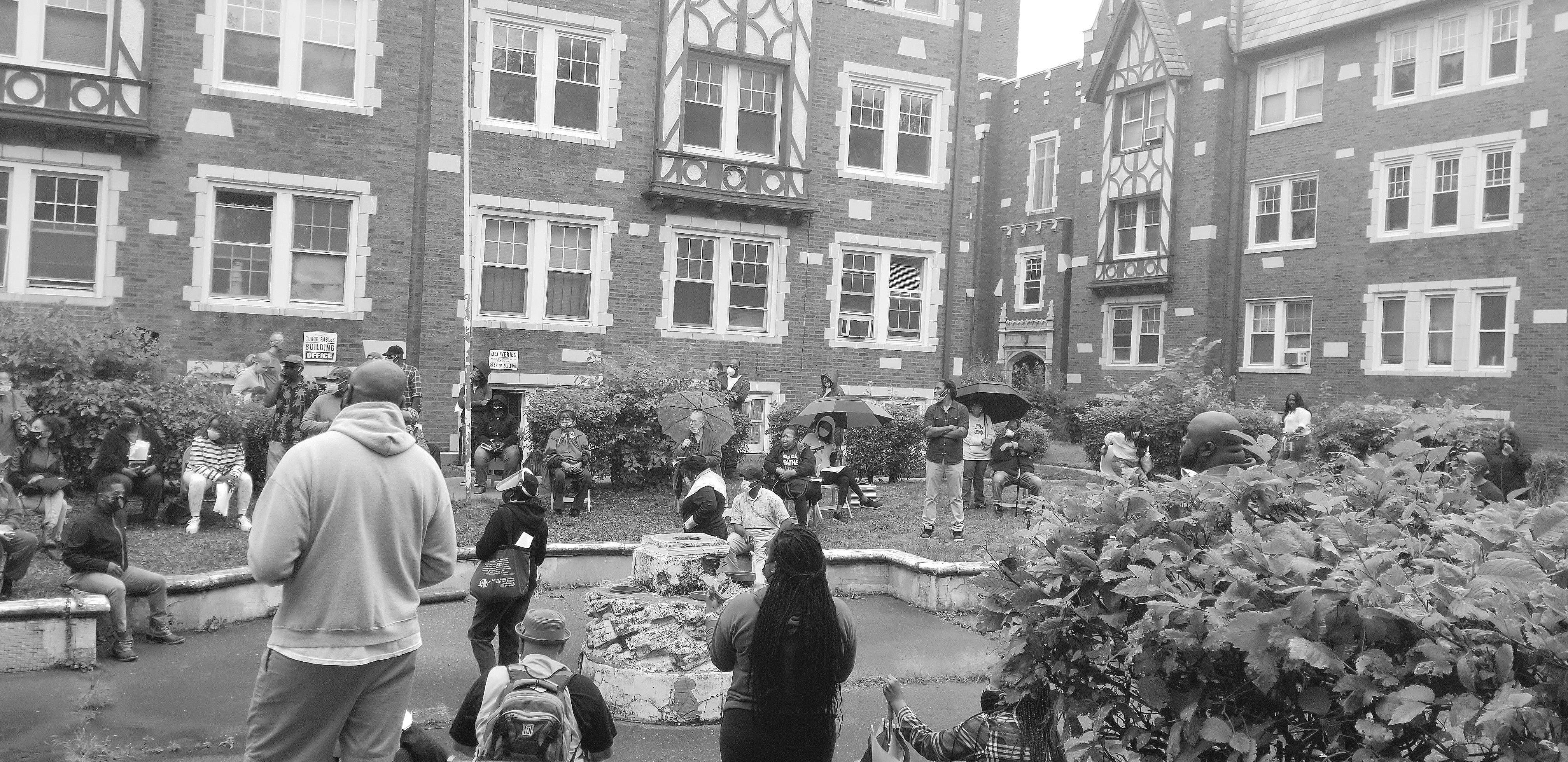
“They made a lot of people homeless,” said House, whose unit’s rehab was completed in 2020 after his ceiling collapsed six years earlier; it was finished just before the board proposed the building sale. “I’m a senior citizen, and I’m on a fixed income; I can’t get no market-rate apartment. I’m on a waiting list that could be years from the CHA.”
Today, the former Tudor Gables building is midway through its second winter of active construction. Four dumpsters sit in the front yard, which is
torn up beyond recognition, with no trace of the famed fountain remaining. Some units sit with windows open, exposed to the elements.
The sight of the building is painful to Dixon. “I can’t drive down Drexel anymore,” she said.
Former residents say the surprise sale of the Tudor Gables, and the board’s dubious management of repairs and finances in the preceding ten years, left them in the dark—and angry.
When Dixon received a letter from the board of directors in early November saying that the last of the building’s bills had been paid and that members would be receiving one last distribution of $140 to $400, she felt renewed anger. As with the preceding payouts to members, the board provided no receipts, no bank
statements, nothing to confirm that there were actually other bills for the board to pay. “There is no transparency,” said Dixon. “I don’t trust y’all. You’re just giving us words.”
“We have been completely lost for words,” said Pia Johnson, a shareholder who was unable to live in her family’s longtime unit from 2015 to 2020 due to severe water damage. She says that she has yet to receive any money from the sale, due to an unresolved dispute with the board over her unit, and has been unable to reach any of the board members since the sale. “You can’t even use the word bamboozle for what has happened in this situation,” Johnson said.
All former shareholders interviewed by the Hyde Park Herald said that they have been unable to get in contact with any members of the last several boards,
including Froehlich. The Hyde Park Herald reached out to all former board members for comment; none were willing to speak on the record.
Almost two years later, members haven’t given up on the building. They want to know: what went wrong at the Tudor Gables? Where does responsibility lie? And where might they find accountability?
The next story in the series will examine the rehab and sale of the Tudor Gables building, and allegations of mismanagement and conflicts of interest among board members. ¬
Posner is a contributor at the Herald and the Weekly


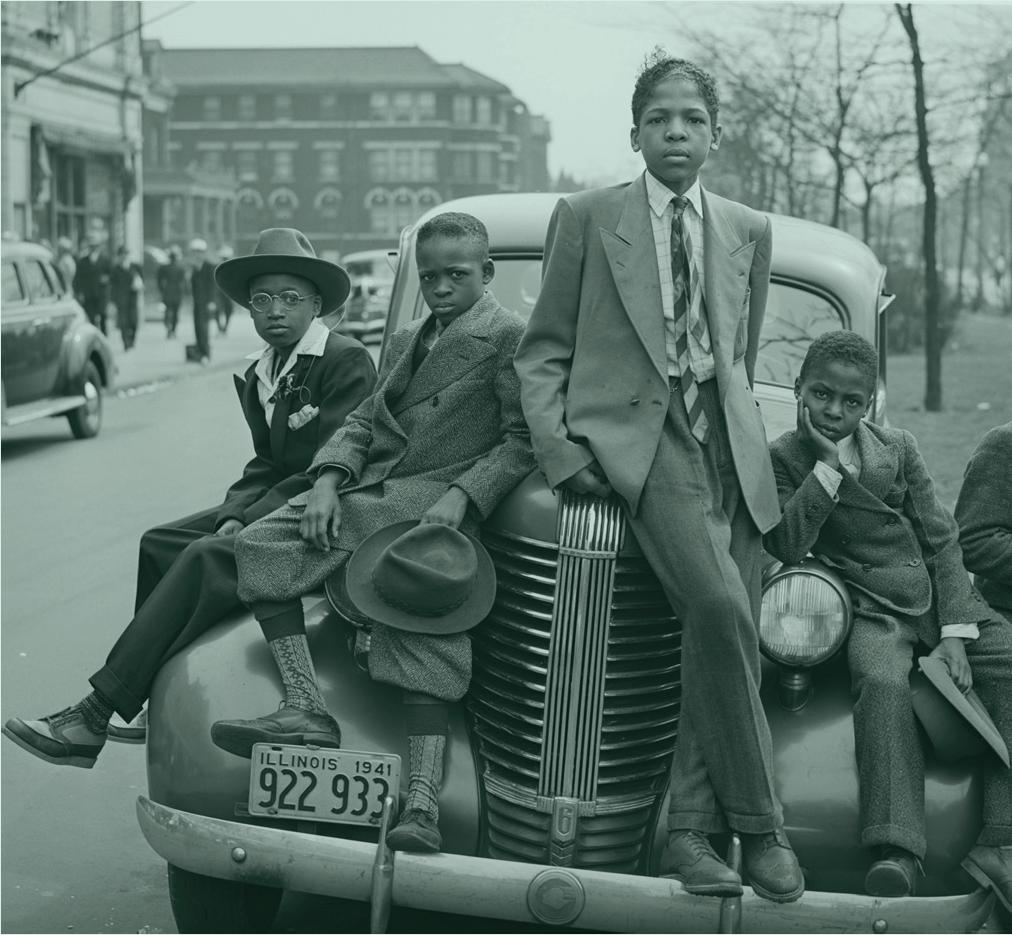
DJ Cymba is what many call a local legend. Carrying the lifelong philosophy that age should not hold you back in this city, the twentyseven-year-old HUEY Gang member has broken into a new creative era, molded by his predecessors but stamped with his own unique style.
Like so many of Chicago’s other musical talents, Cymba got his start at YOUmedia, Chicago Public Library’s legendary program for teens interested in digital media, music, and production. As a teenager, he was in the throes of music, art, and culture, surrounded by talented friends and rising stars, and cultivating his craft.
Fueled by the raw talent of everyone around him (and his own experience as a former rapper), DJ Cymba entered a creative metamorphosis. He went from soundtracking for house parties and open mics, to curating his own events, going on tour with acts such as Mother Nature, and using hip-hop as a way to give back to Chicago’s youth—all while perfecting and elevating his own work as a DJ.
Cymba—or the “Lemon Pepper Legend,” as he’s sometimes called—may not know everything, but he knows enough to keep evolving, and to help the homies out along the way.
Read on to learn more about Cymba’s path and what’s to come in 2023. For more, follow him on Instagram @djcymbaofhuey or visit www.djcymba.com.
This interview has been edited for length and clarity.

Q: Let’s set the scene: the year is 2011 or 2012. Before you were known as DJ Cymba of HUEY Gang, you were an artist known as Cymba Bridges. How have you evolved over the past decade? What was it like DJing all those open mics and house parties?
DJ Cymba: I’m really big on experience. I feel like the only way I can evolve is through learning experiences. Going through certain things and realizing— either you’re an exception to the rule, or this is how life is. Being in multiple
environments—and always being a student, trying to soak up some form of knowledge, or analyzing a situation to see what can I learn to make me better.
I think a decade ago, I wasn’t [doing that]. I was still always trying to learn, but I [had to learn to keep] an open mind and realize that you just don’t know everything, [you have to be] open-hearted in any and every situation. I don’t think I had an ego, I just wasn’t as open to different perspectives.
Was there a moment that made you shift your perspective?
During that time period, one of the main things was just being surrounded by a lot of talented, raw people. Wanting to change your perspective—like thinking that only one person can be famous, or only one person can have momentum. Going to those YouMedia open mics every day, you start realizing that it’s a whole community—a whole network— of people who think are raw.
What is the HUEY Gang collective? When did it start?
I’m not a founding member of HUEY Gang, but I was introduced to it around 2015. I believe it started around 2011 or 2012 with Stark of HUEY, TheLawofHUEY, and Leader Lockwood. The running joke is that it’s like over fifty members of HUEY Gang, and not everyone has met yet. But the [members I named] are the main ones. They all met in high school when they attended Urban Prep.
So what does this collective stand for? What are some of the values you hold?
The “HUEY” in HUEY Gang stands for “Headstrong Urban Educated Youth.”
Though obviously, we’re beginning to get a lot older than we were in 2012. So now “Headstrong Urbanites Educating the Youth” has been the reformed version of that.
But some of those values are just in the name. For one thing, the name of the collective is partly in honor of Huey Newton, really standing behind the Black Panther ideology and learning from that era of Black militant leaders. Obviously, having somebody like Brother Mike as a mentor and brother, or the Phenom people, who come from a very radical, revolutionary, creative community, inspired us to become that or evolve in that direction. We hold a lot of other values, like educating the youth, so a lot of us have either delved into that field or are still a part of it. Many of us have been mentors or teachers for young adults or just kids in general.
It’s essentially a brotherhood, too. These are guys that I love and that I could call my brothers. We have built a family, even outside of music—like, the music is gonna come naturally just because all of these people are genuinely talented. But to have somebody that… when you’re like, “Man I'm really going through this,” and they’re like, “How can I help? How can I help you evolve?” Certain conversations that you wouldn't have with just anybody, but this is a safe space for you to trust somebody with a certain amount of vulnerability that you’ve been growing with.
What type of impact do you think the collective is making? Not just in the music scene, but in your respective communities?
I think [a big part of] the impact has been keeping young adults from feeling like they’re too young to do anything. Finding the tenacity to realize that age really isn’t a thing.
There aren’t too many groups or collectives, per se, in Chicago that can say that they have longevity, that can say that they have that certain level of connection. And a certain level of understanding. Even if you never heard any more music coming out of HUEY Gang, there are two things you can always count on. One: We’re always gonna love each other, and two: we will always make sure the people around us are good. Whether that be out West, whether that be out South, or whether that’s just making sure that we keep tapping into certain things where we can pour back into the community.
Shifting gears a bit, when did you fall in love with the art of DJing?
I’ve got a best friend-slash-brother that I grew up with, and his dad is a House DJ. I remember the first couple of times that I stayed at his crib, his dad had the DJ equipment in the basement. I grew into a genuine curiosity—when he actually showed me how to make songs on my own, I was like, this is kind of cold. And then you know, you step away from it. Everybody around you [is] being a rapper, so you’re like, “Oh, yeah, I'm gonna rap, too. Because I think I got it. I can. I can make words rhyme, or I can do double entendres”. But I think the thing with me not rapping anymore was that I just didn't feel like it was genuine.
The reason I even started DJing was essentially when HUEY Gang was at YOUmedia, Brother Mike had just passed away, and he passed on the open mic to us to start running it. At the time, I was rapping, but we needed a DJ…I learned just by doing open mics at YOUmedia with HUEY Gang.
You’re usually behind the scenes, but on December 16th, you kicked off your
new series, Cymba Sessionz at SoHo House. What can people expect from this series?
The original Cymba Sessionz was a way for me to not have to wait to get booked. In my limited perspective at the time, I thought DJs were supposed to throw parties, drop mixes, and drop mixtapes. I wanted to DJ as often as I could and I just didn’t want to wait to get booked, so I would just throw parties at the crib. These house parties turned into something a little more elevated, where you would come in and the set was very intentional.
At the end of the day, I definitely want to create and build with other DJs. It went from that, to also wanting to create a safe space for DJs to play [in an] open format as much as we could. I also wanted to create a space for people to feel more comfortable listening to all different types of music, especially newer music—just as much as we listen to older music. If you love music, this is the space for you. If you love organic networking, this is the space for you.
Sounds dope. Talk Some Shit Show is your platform where you invite members of the creative community to engage in light-hearted convo and share their life philosophy. What is your life philosophy?
My life philosophy is essentially to create safe spaces for everybody. When people don’t feel safe, they start living off their trauma. We gotta start being a lot more considerate and nicer to each other. ¬
Kia Smith is a lover of words and a digital storyteller. She previously wrote about artist Schenay Mosley for the Weekly. Keep up with her on Twitter and Instagram
Historic cinema, now under new ownership, to get ‘luxury’ facelift.
BY DIERDRE ROBINSONHyde Park’s 107-year-old Harper Theater is getting new owners and a revamp after the retirement of former proprietor Tony Fox. Emphasizing the theater’s “luxury” renovations, new owners Main Street Theatres are shooting for an early spring opening.
Fox told the Hyde Park Herald in November that after ten years of running the four-screen, prairie-style theater, the cinema “hadn’t turned a profit for the last couple of years,” and he would be stepping down.
The building, located at 5234 S. Harper Ave., is owned and leased out by the University of Chicago. The university finalized plans with its new vendor on November 10 of last year; the theater closed temporarily on November 30 to begin renovations.
Based out of Omaha, Main Street Theatres operates cinemas across Nebraska, Wisconsin, and Iowa, primarily around college towns. The South Side
location will be the company’s first in Illinois.

Harper Theater’s iconic building was constructed in 1914, opening a year later as a 1,200-seat vaudeville house complete with a Kimball pipe organ. It was designed by renowned Chicago architect Horatio Wilson, whose craftsmanship can be seen throughout the city in the designs of houses, banks, apartment buildings, and factories. Harper was converted into a movie theater in 1935.
Listed on the National Register of Historic Places as part of the Hyde ParkKenwood Historic District, the theater has seen its fair share of changes over the years: turnovers, periodic shutterings, renovations and reopenings.
If everything goes according to plan, the theater’s new owners said they hope to “raise the bar” for neighborhood movie houses. They have so far spent half a million dollars on renovations, hiring the high-end construction contractor and developer LG Group to oversee the
revamp.
Micheal Barstow, executive vice president for Main Street Theatres, said renovations should last about three months.
“We’re targeting a really early spring opening. We’re not doing anything too structurally or substantially that should really slow it down,” he said. “It’s a lot of just putting our character into the building”
One such character change is removing the theater’s current seats and replacing them with “luxury, heated recliners.” Aside from the reduction of total seats in the theaters, the rest of the layout will remain unchanged. Its name and unique historical features, such as the
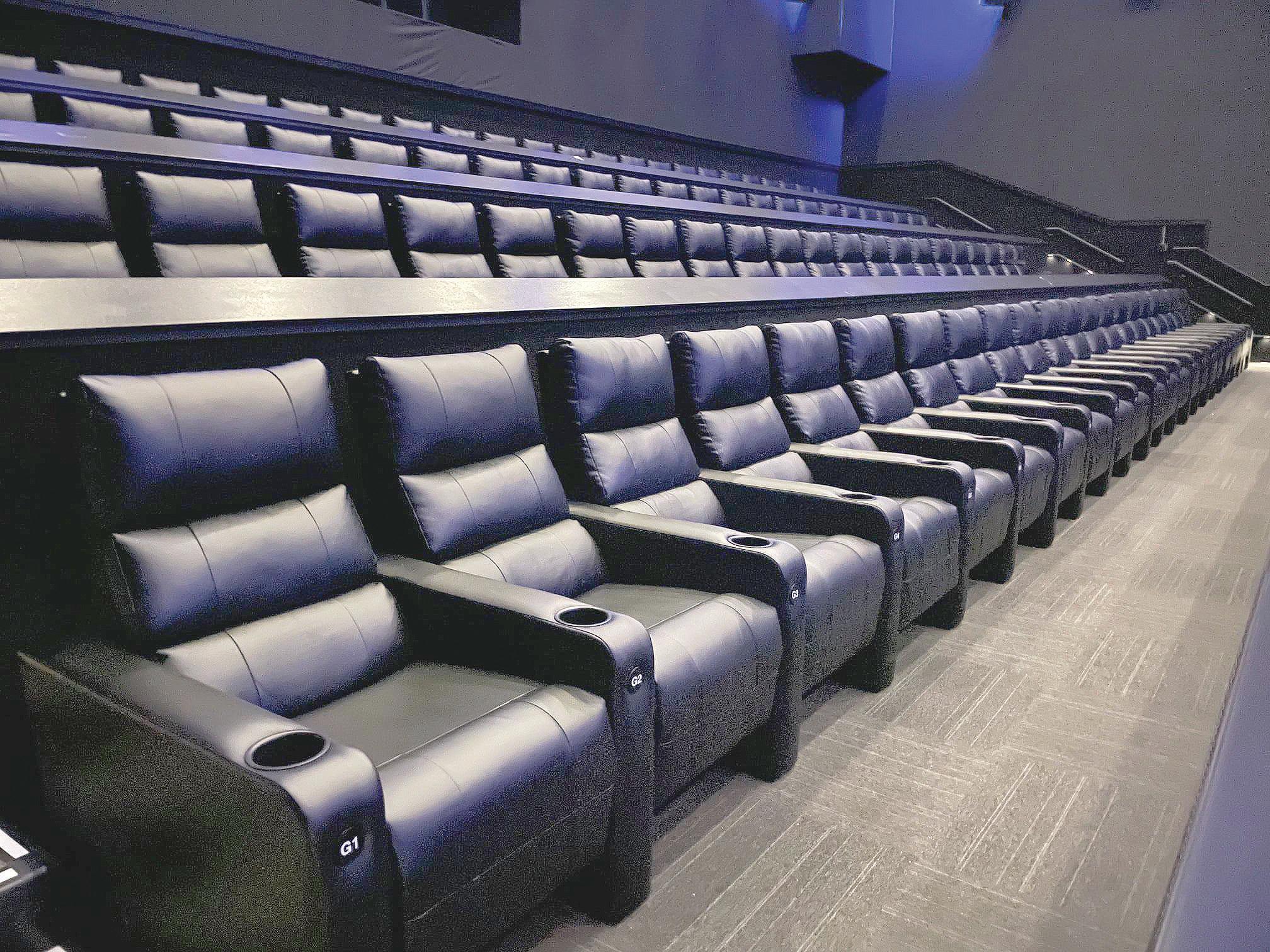
marquee, will also remain intact.
“How cool is that when you’re looking from 53rd [Street] down Harper [Avenue]? How gorgeous that building is with that marquee when it’s all lit up at night,” Barstow said. “Seriously…if it ain’t broke, don’t fix it.”
He added that they will improve their concession and drink offerings to “complement the food scene that’s happening on 53rd Street.”
“We get to bring in our culinary guy and our beverage guy, and we get to hang out in the space and walk around the neighborhood and see what gaps might be there,” Barstow said. “I think it would be a disservice to us and the community if we were just a popcorn, candy, and soda theater.”
Barstow said that he wants “the legacy to be just like a place of community, where you can go and you’re seeing familiar
people and [if] you go there frequently, you know who the manager is, you know the employees and you’re welcomed in.
“[We hope] we can be that place of community for not only just the movies, but special events…just a fun place to
be where we can just share those human interactions.”
Harper Theater is expected to open this March, just in time for the release of blockbuster movies like Creed III and John Wick: Chapter 4 ¬

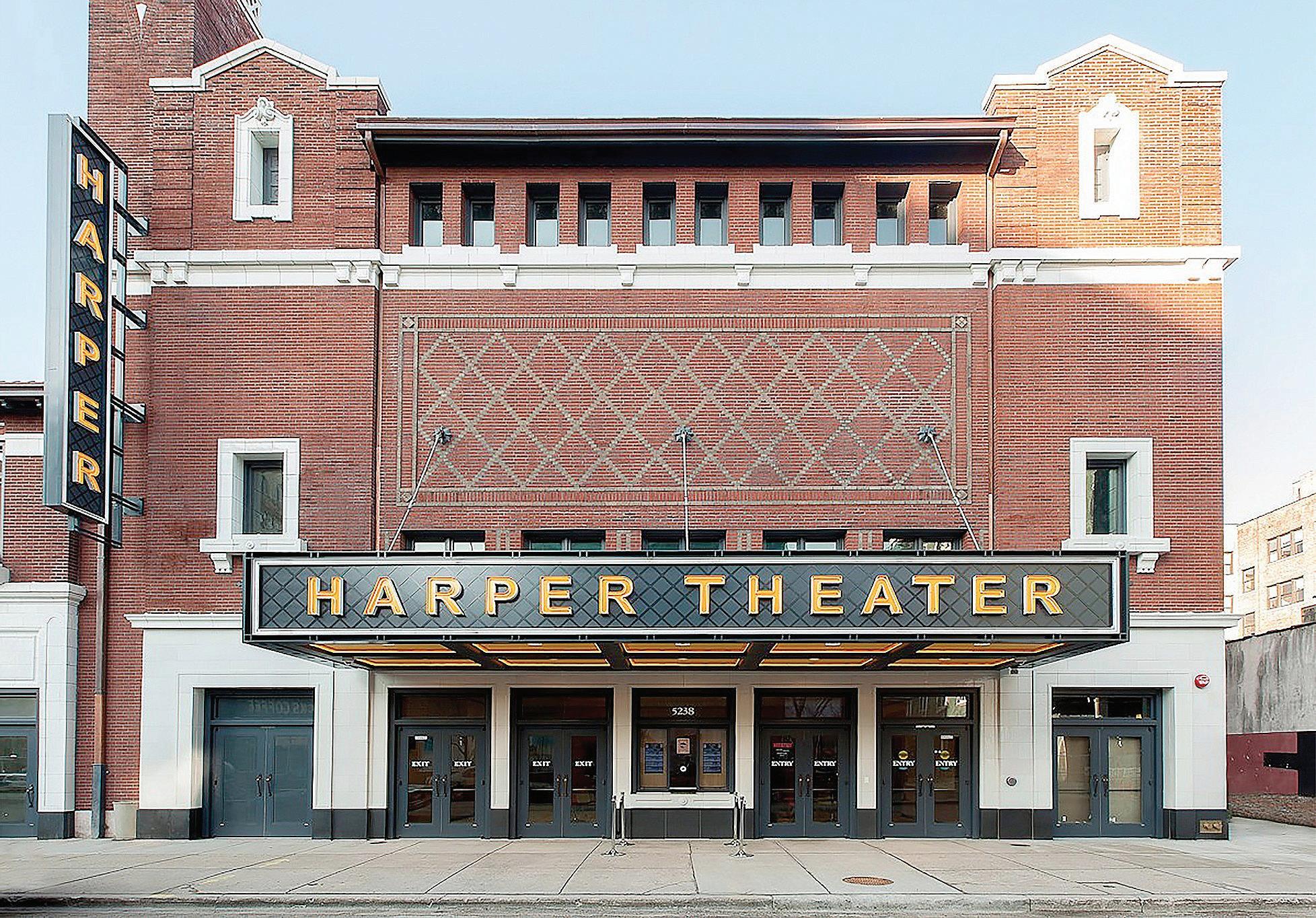
“We just kept talking and it just ended up falling into place. It was the right time [and] it became the right deal.”Dierdre Robinson is a writer and accounting manager in Chicago. Her last piece for the Weekly covered Court Theatre's new associate artistic director, Gabrielle RandleBent.
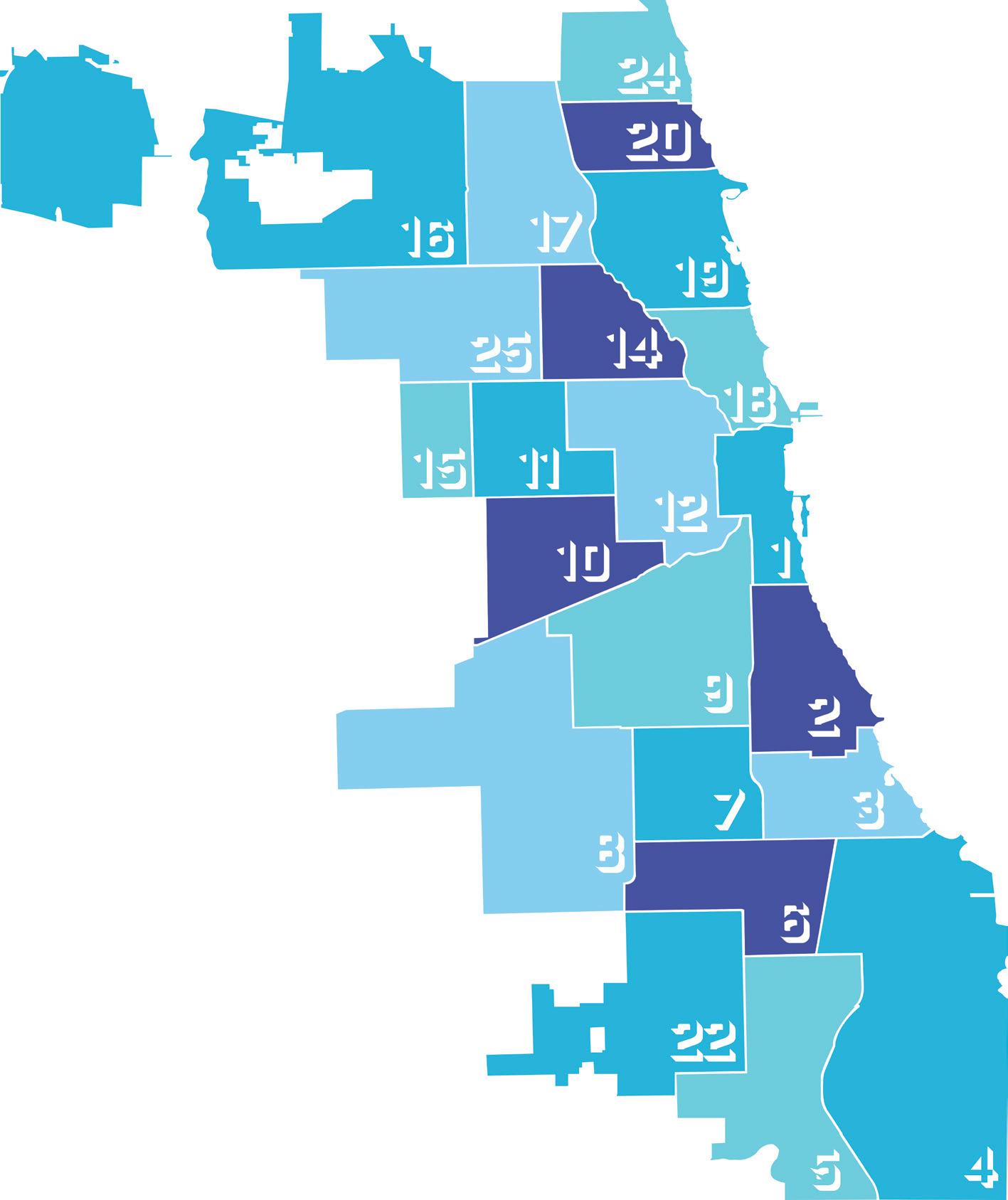
Three councilors will be elected to serve in each of the twenty-two police districts for four-year terms.
BY SKY PATTERSON AND JIM DALEY, CHICAGO READERThis piece was co-published with the Chicago Reader
This February, Chicago will make history.
After decades of struggle by thousands of people who organized, marched, prayed, petitioned, and clamored for the right to have a say in how their communities are policed, on February 28 Chicago voters will elect sixty-six people to serve on police district councils across the city.
The battle for community control of the police in Chicago has been waged for more than a half-century. Deputy Chairman Fred Hampton and the Black Panther Party sparked the first push in the late 1960s. In the decades since, organizers have won incremental concessions. The Office of Professional Standards was created within the police department in 1974. It was replaced by the Independent Police Review Authority (IPRA) in 2007, which was in turn replaced by the Civilian Office of Police Accountability (COPA) a decade later. Each agency was created thanks to the tireless efforts of ordinary Chicagoans—none of the people serving on them were democratically elected.
The police district councils will be elected. Three councilors will serve in each of the city’s twenty-two police districts for four-year terms. Each council will be made up of a chairperson, a community engagement coordinator, and a member of the citywide committee that nominates members of the citywide Community Commission for Public Safety and Accountability (CCPSA). The committee can nominate fourteen people, of whom the mayor must choose seven.
Chicagoans have been promised police reform before, and the department’s entrenched attitude against change could
make some wonder how effective the district councils will be. One clue to the power they may wield lies in who’s running.
In addition to ordinary residents and dedicated activists, candidates with law enforcement ties are on the ballot. The Fraternal Order of Police’s (FOP) election attorney challenged several progressive candidates’ ballot petitions, is listed as the contact person for six more on Chicago Board of Election Commissioners filing, and is himself running.
The Reader sent questionnaires to candidates, interviewed as many as could be reached, and researched their backgrounds using sources ranging from social media to biographies compiled by the Empowering Communities for Public Safety (ECPS) coalition. The full questionnaire responses are on the Reader’s website.
If you’re unsure of your police district number, you can find your police district at The TRiiBE’s election center (bit.ly/ TRiiBEMap) and your polling location at bit.ly/ChiPrecincts.
The ECPS ordinance tasks each district council with the following:
• Hold monthly public meetings to discuss policing issues
• Work with the police district commander and community members to help develop and implement community policing initiatives
• Delegate members to attend quarterly and annual meetings with representatives from all twenty-two district councils
• Work to develop and expand restorative justice and similar programs in the district
• Encourage police officers to facilitate access to community resources
• Assist and engage with members of
the public, including gathering input from the public regarding public safety and policing in their districts
• Report its findings, conclusions, and recommendations to the CCPSA
• Make policy recommendations to CCPSA














• Respond to community members’ questions and concerns by requesting information related to investigations from the department or COPA
• Provide information to police and community groups on the work of the commission and district councils








(Source: Municipal Code of Chicago, 2-80-070(a) and (e))


Ephraim Lee: A Navy reservist for 24 years, Lee is pursuing a master's degree in social work. He said that the CPD has lacked high standards of professionalism, which has led to increased crime and community distrust. He wants to “bring leadership, fairness, and transparency to a police department that is struggling to live up to its members and the citizens of this city.”
Coston Plummer: A home-care worker and a member of SEIU, United Working Families, and the Chicago Alliance Against Racist and Political Repression, Plummer has done community work in Washington Park since 2016. Alderperson Jeanette Taylor and SEIU have endorsed. “I want every neighborhood to have the policing it deserves,” he says, “and I want to be the vessel to my community that helps make that happen.”
Jamie Brown: An attorney, Brown was a volunteer advisor for Daniel Biss's 2018 bid for governor. She was on Chicago Votes' board of directors for three years and is a precinct captain and zoning board community representative in the 25th Ward.
Alexander Perez: Worked for Aurora's mayoral department of communications for four years and was the director of community engagement for a West Aurora school district for over a year. He says he’s running “to increase transparency and accountability through modernization of communication and outreach efforts.”
Sarah Kammerer: Worked in Congress and on Mitt Romney's 2008 presidential campaign. Kammerer co-founded ChiWomenVote and IlliniosWomenVote and serves on the advisory council of New Politics and the leadership council of ProPublica.
Julia Kline: A former CPS teacher, Kline is a community organizer, sales and marketing consultant and voting rights activist. In 2020, she co-founded Neighbors Who Vote, which works on voter registration and turnout, cross-neighborhood organizing, and amplifying the work of other groups in the space with Woodlawn resident Morrow Cleveland. works on voter registration and turnout, cross-neighborhood organizing, and amplifying the work of other groups in the space.
Ana Marija Sokovic: A computational scientist at UIC, she participated in the nonviolent student movement in Serbia from 1998 to 2000 that overthrew Slobodan Milošević. “I experienced first-hand that the people together, with discipline, humor, and careful planning, can move mountains,” she said. She envisions a public safety approach where "the community is empowered, and healing and reconciliation are prioritized over punishment." Gregory Mitchell (7th Ward alderman), Martina Hone (5th Ward aldermanic candidate) have endorsed.
between CPD and residents. She supports a two-strike rule for officers who garner racial and violent complaints and wants to end qualified immunity.




Julio Miramontes: A community organizer and social infrastructure engineer, he was 10th Ward alderperson Susan Sadlowski Garza's director of community engagement and government affairs. He founded the Southeast Side of Chicago Food Pantry and helped establish the United Neighbors of the Tenth Ward Independent Political Organization.
and was a CPD member until 2010. The Invisible Institute's Citizens Police Data Project reports he had 21 allegations of misconduct over his career, more than 77 percent of officers in the department; two were sustained.






Craig T. Carrington: A community court case manager for the Restorative Justice Community Court in Englewood, Carrington has also worked as a court liaison for the Cook County Adult Probation Department, a community organizer for Saint Anthony Hospital, and a paralegal in the Office of the Illinois Attorney General.
Jim Blissitt III: A member of CAARPR, Blissitt has worked with a variety of community organizations including the Resident Association of Greater Englewood and Chicago Community Trust. With the Children's Defense Fund/Woodlawn Children's Community Promise Freedom School, he organized youth demonstrations against gun violence. He also worked with the Urban League to facilitate police board community input forums. Blissitt owns a cannabis transportation company.
Anthony David Bryant: A strategist, public administration expert, and social justice professional from the south side, Bryant has worked as a government affairs associate for Metropolitan Family Services, a legislative administrator for State Representative Lamont J. Robinson, and a community outreach and engagement associate for The TRiiBE. Alderperson Taylor (20th Ward), State Representative Lamont J. Robinson (5th), Desmon Yancy (5th Ward), and Jocilyn Floyd (7th Ward), and the Center For Racial & Gender Equity Coalition of African American Leaders have endorsed.
Brenda Waters: A healthcare worker for almost 50 years, Waters is the president of Friends of Merrill Park and serves on the Merrill Park Advisory Council through the Park District. She told the Reader her sister was shot in the back by CPD in the 1990, but survived. If elected, she says she’ll “insist on building stronger connections between police and the community and getting community input” on policing.
Ponchita Moore: A grievance representative for SEIU HCIL, a union of healthcare workers, Moore has attended protests against police brutality in the past. She believes “all Chicago citizens deserve fair policing and community services that are tailored to the challenges and needs of our communities despite our social or economic backgrounds.”
Gloria Jenkins: Seventh Ward alderperson Greg Mitchell has endorsed.












Michael E. Mayden: An ordained minister, Mayden is also president and founder of Future Entrepreneurs of America, a nonprofit that promotes sports management. Mayden served on a Local School Council for two years and has run for alderperson and state representative. His platform includes bimonthly community meetings, common-sense policing, and “community and the police working together as one.”
Janice Jones: A resident of South Shore, Jones is facilitator for CPD beat 334. She says “no single approach is right for every community.” Alderperson Greg Mitchell (7th Ward) has endorsed.
Lovie Bernard: An assistant to Seventh Ward alderperson Greg Mitchel since 2021l, Bernard joined the Black Panther Party as a teenager and was among the first patients at the Party’s free clinic. She remembers viewing the aftermath of the CPD assassination of Fred Hampton and attending his funeral. Mitchell has endorsed.
Kenya Franklin: A political strategist and mother of three children, Franklin has lived in the third police district her entire life. She wants to improve transparency
Meridth Vanae Hammer: An attorney in real estate law, contract law, and trust and estate planning, Hammer is founder and CEO of an Indianapolis real estate law firm. She served as deputy general counsel to the Clerk of the Circuit Court of Cook County. Hammer ran unsuccessfully for Cook County judge in the 2022 primary.
Thomas L. McMahon: A retired Chicago police captain, McMahon was a gang homicide detective from 1980 to 1996
Eric Russel: Founder and executive director of Tree of Life Justice League of Illinois, a nonprofit that advocates for police accountability and provides services for families affected by police violence. Congressman Danny Davis (IL-7), St. Sabina parish priest Michael Pfleger, and Violence Interrupters have endorsed.
David Boykin: A musician, educator, and high school counselor from the west side, Boykin has lived in the Sixth District for over a decade. As a counselor, he works extensively with teenage Black boys, whom he says are “the most at-risk demographic to be subject to interaction with the police and the carceral state” and that his experience has given him “an understanding of the need for alternative policing strategies.”
Joseph Williams: A resident of West Englewood, Williams did not respond to requests for comment.
Verna Swan: A resident of West Englewood, Swan did not respond to requests for comment.
Linda J. Austin, Sr.: A resident of Englewood, Austin did not respond to requests for comment.







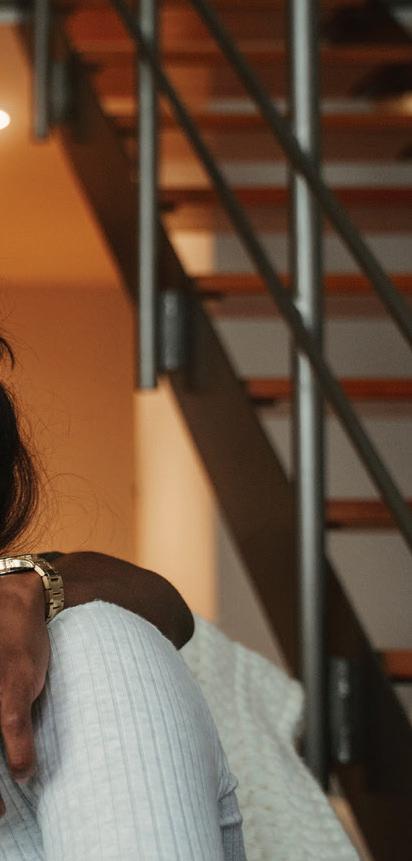

Dion Terrell McGill: A community outreach manager at Lurie Children’s Hospital, McGill describes himself as a “public health professional focused on gun violence prevention and public safety for more than seven years.” McGill formerly taught in CPS and was the program manager of the Student Voices Program, a youth gun-violence initiative at the Illinois Council Against Handgun Violence.
Krystal Peters: A member of the Workers Center for Racial Justice, Peters also serves as a district leader for the Center for Racial and Gender Equity (CRGE). She criticized CPD’s proposed gangdatabase redux at a November meeting of the Interim Community Commission for Public Safety and Accountability, and is “committed to advancing community public safety and police accountability practices [and] ensuring Black communities have a voice at decisionmaking tables.” CRGE has endorsed.
Teresa R. Chandler: A community outreach specialist at the Cook County Assessor's Office, Chandler has a Masters in Inner City Studies and a Bachelor's in Criminal Justice and Corrections.






Cherli Montgomery: Cherli Montgomery is a member of Teamsters Local Union 727 (IBT) and served on the Local School Council for Charles W. Earle elementary school. Alderperson David Moore (17th Ward), State Representative Sonya Harper (6th District), and Congressman Danny Davis (IL-7) have endorsed.
Mark Hamberlin: A technician at Rentokil Boecke, Hamberlin is a union steward of the Teamsters Local 781. He is active in the Facebook group 18th Ward Connection, and alderperson David Moore (17th Ward) recently recognized Hamberlin with a service award. His vision for the district council is “to ensure everyone is held accountable for solving problems.” Alderpersons Stephanie Coleman (16th Ward), Moore, Derrick Curtis (18th Ward), and State Senator Willie Preston (16th District) have endorsed.
Albert “Al” Cacciottolo: A superintendent at the Department of Streets and Sanitation, Caccatolio is described as an “advocate for police.” Alderperson Silvana Tabares (23rd Ward) has endorsed.













Carlos Sanchez: A resident of McKinley Park, Sanchez did not respond to requests for comment.
Jason Huff: A car-booting supervisor for the city, Huff runs a neighborhood watch, and his social media pages regularly tout volunteer work with CPD programs such as youth soccer events and catalytic converter anti-theft efforts. Alderpersons Raymond Lopez (15th Ward), Derrick Curtis (18th Ward), and Silvana Tabares (27th Ward) have endorsed.
Denise McBroom: A CPS teacher who was the last chief of staff for former alderperson Patrick Daley Thompson (who was convicted on federal charges related to an alleged bank-loan fraud in 2022), McBroom applied to be appointed to replace him, but was not selected by the mayor.
Abe Matthew: A Bridgeport injury attorney, Matthew says he’s “a firm believer that transparency and community input into public safety decision making will improve outcomes and protect both officers and our neighborhoods.” He ran for Congress in 2020 before withdrawing and endorsing Marie Newman, and recently testified before the Illinois General Assembly’s redistricting committee.
Elianne Bahena: A Little Village resident, Bahena has worked in nonprofits advocating for domestic violence survivors and for immigrant rights. She serves as the director of policy and community outreach for the 22nd Ward Public Service Office. Bahena also serves on several boards including those of Mujeres Latinas en Accion, Enlace Chicago, and HACE Chicago. 22nd Ward IPO and Alderperson Michael Rodriguez (22nd Ward) have endorsed.
Letina K. Brady Pettis: Is active with the League of Women Voters as well as organizations such as the National Association of University Women, the National Coalition of 100 Black Women, and the National Council of Negro Women. Her spouse is a CPD officer.
Alderpersons Stephaine Coleman (16th Ward), David Moore (17th Ward), Derrick Curtis (18th Ward), Silvana Tabares (27th Ward), and the Chicago Police Sergeant Association have endorsed.







Nolberto Casas: A political liaison at Chicago Gig Alliance, Casas describes himself as a community activist and organizer for environmental justice, living wages for rideshare drivers, and public safety. He attended DePaul University and Brother Rice High School.
Maggie Finucane: A Bridgeport resident, Finucane filed ballot petitions with the assistance of the FOP’s election attorney, Perry Abbasi, who told the Reader the FOP referred her to him. She did not respond to requests for comment.
Cydney Wallace: A lifelong south sider, Wallace has volunteered at the schools her children attend, at her place of worship, and with local nonprofits.
Evelyn Razo: A resident of Back of the Yards, Razo unsuccessfully challenged the ballot petitions of Vicko Alvarez, a socialist candidate who is running for alderperson of the 15th Ward. Razo did not respond to requests for comment.
Monserrat Ayala: An organizer from the southwest side, Ayala co-founded #IncreaseThePeace, an organization that promotes youth leadership, peace, and community organizing. She has also worked for the Southwest Organizing Project, where she led get-out-the-vote efforts in 2019.
Simeon Henderson: A Chicago Public Schools educator, Henderson was a Chicago police officer from 1998 to 2004, during which time he garnered six complaints, one of which was sustained. He says the CPD budget should be increased, and that his experience as an officer can help "bridge the gap between our neighborhoods and the police officers,” adding, “it starts block-by-block and district-by-district.”
Erin Vogel: A former co-executive director of I Grow Chicago (now We Grow Chicago), an Englewood community organization, Vogel has participated in gun-violence prevention and criminal justice reform since 2016. She has completed the CPD’s Citizen Academy and has trained officers in restorative justice practices. She believes in “keeping the integrity of the ECPS ordinance and connecting communities through healing.”
Rosemarie Dominguez: A lifelong Little Village resident and longtime community organizer, Dominguez has a master’s in Latin American and Latino Studies from UIC. She said “residents and CAARPR were the ones that prompted me to run, and they are the ones that are going to shape me and my campaign.”
Larry Lawrence: A lifelong west-sider, Lawrence is the senior pastor of Praise Temple of Restoration in Austin. He works with youth at the Cook County Juvenile Detention Center, and says he’s running “to help bridge the divide between our police and the communities in which they serve.”
Leo Guzman: A lifelong Little Village resident, Guzman started the Little Lawndale Neighborhood Studio, a community gathering space that has invited police officers to host and participate in events in order to interact with community members.
Kiisha Smith: A youth and community advocate from Lawndale, Smith says she knows “exactly what it’s like to be harassed by the police as well as to call them and NOT receive the help, assistance or protection I needed.”




John Donatelli: A real estate broker who lives in the West Loop, Donatelli says he’s concerned with crime and accountability. He hopes “to further open dialogue between the [police] district and the neighborhood” and says the CPD’s budget should be increased.
Lee Bielecki: A retired CPD sergeant, Bilecki has said, “the best results are when the community partners with the police," and that he is running “to listen and help give community members a voice [and] to give the police input as well.”



12th DISTRICT


Leonardo Quintero: An organizer around youth and family issues such as schools, jails, and funding, Quintero says, “by prioritizing both police accountability and restorative justice, it is possible to create a more just and equitable criminal justice system that promotes public safety and helps to build stronger, more trusting relationships between law enforcement and the communities they serve.”
William Guerrero: A 21-year-old artist from Pilsen, Guerrero has organized community events such as open mikes, pop-ups, and peace initiatives. He says he wants to bring a youth's perspective to the district council. He says he's running to hold elected officials and public servants accountable and making sure there is accountability and transparency from them. Alderperson Byron Sigcho-Lopez (25th Ward) has endorsed.
Matthew Bianciotto: A resident of Mount Greenwood, Bianciotto did not respond to requests for comment.
Patrick Kennedy: A resident of Mount Greenwood, Kennedy did not respond to requests for comment.
Chloe Vitale: A journalist who has worked with City Bureau’s Documenters program, Vitale is a member of the Bricklayers and Allied Craftworkers Local 21.







Andre Pate: Pate, who has worked in the Cook County Circuit Court for over 20 years, is an operations manager for the Cook County Clerk's Office. He's running “to create an environment of accountability, trust, and collaboration.” ¬


Juan Lopez: A security consultant who has lived in Pilsen for 38 years, Lopez says high crime in the area is due to few officers and community mistrust.
Michelle D. Page: A CPS teacher assistant, Page has worked with the Community Renewal Society, a faithbased organization that addresses racism and poverty and helped work to get the ECPS ordinance passed. “I know all too well how Black and Brown people are treated, or shall I say mistreated,” she says. “This is an opportunity to change some of the wrongs that have been going on for so long.”
Carissa Parker: A healthcare professional, Parker has been chair of Morgan Park High School's Local School Council for a decade. Her son is a Chicago police officer, and she co-founded Moms of CPD, a group that aims to create positive interactions between officers and community members.
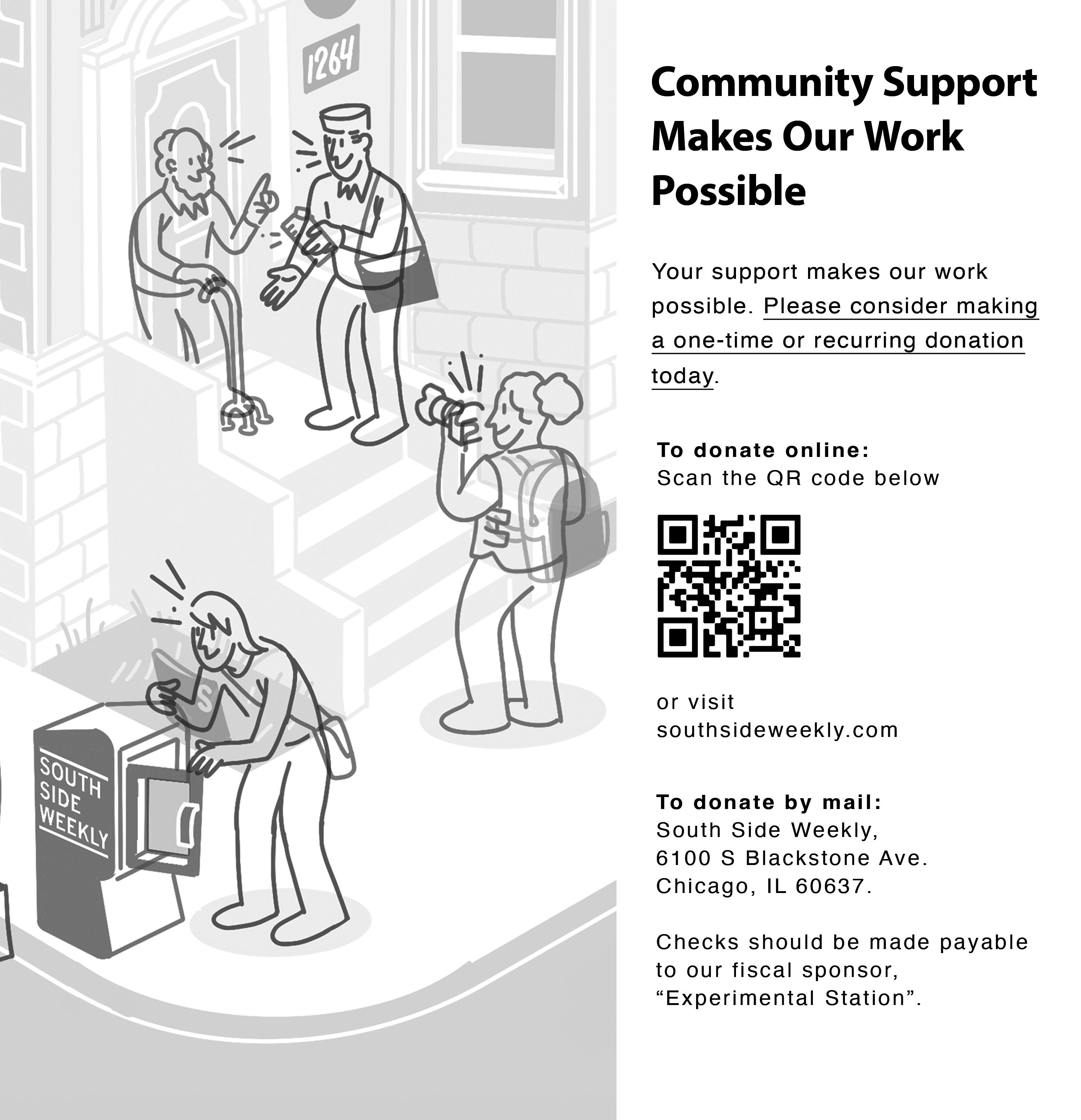
The Exchange is the Weekly’s poetry corner, where a poem or piece of writing is presented with a prompt. Readers are welcome to respond to the prompt with original poems, and pieces may be featured in the next issue of the Weekly.

If you are reading this, congratulations, you made it. Or you didn’t, and you’re a nosy ghost peering over the shoulder of a person holding a newspaper or scrolling on their phone. Either way, the odds have been defied.
They say that ghosts can’t read but I’ve seen odder things. Said chickens can’t fly but maybe they only do it when no one is looking. I heard both chickens and ghosts are just trying to get to the other side.
Heard the same about you, too. You kept waking up even when you didn’t want to, good thing you have no control over that, but I’m still here to congratulate you. God chose to wake you up and you have managed not to cancel that order. Or you tried but His card already went through. Or you tried to place an order of your own and your card declined.
Congratulations, you are broke, so all there is left to be is fixed. We’ve tried everything else. Congratulations,
you could tell the chickens and ghosts and the warm face of any pillow about all types of other sides. Like the time that thing happened, or all those things happened, and you just kept waking up every day because sometimes it’s all you could do. You continually met the other side of days and weeks and months until they all ran out, until you reached here, on the other side of another year. Congratulations. Congratulations. Congratulations.
Take a moment to write a piece in celebration of your continued survival. This could be a poem or a stream-of-consciousness piece. Submissions could be new or formerly written pieces. Submissions can be sent to bit.ly/ssw-exchange or via email to chima.ikoro@southsideweekly.com.
The Exchange is the Weekly’s poetry corner, where a poem or piece of writing is presented with a prompt. Readers are welcome to respond to the prompt with original poems, and pieces may be featured in the next issue of the Weekly.

Let me tie my hairs back slick, pull my sleeves up tight because I’m in the business of undoing my days, loving on myself, taking sweet time. On the clock, I turn water into wine, melt sharp red onion slivers and tart lemon slices, rind and all, into jammy candy sticky on all ten of my brown fingers. Settle a sizzle of Sunday chicken in my cauldon. I’m brewing magic in my kitchen, in my home, in my world. In your mind I say yes to pulling up stools at the mahogany bar -we can do the chophouse on the cheap sneaky you say. This time, I say no. I say I’m in my Sunday best believe I’m wearing my grandmother’s gold. This time, I say no you see, I’m taking myself for a night in my kitchen, in my home, in my world sipping on my homegrown, new town company. Let me set the scene, table set with my clearance porcelain, thrift store crystal holding candles raging a welcome. This time, I say no you must see I am the guest, the host, the lover, the joint lighter, the finisher, the seducer, the gentleman, the I’ll get your ass back sweet talker. This time, I say no you best believe I’m lighting the damn candles where I live and burn.
Chima Ikoro is the Weekly’s Community Builder. THIS WEEK'S PROMPT:
“COME CELEBRATE WITH ME THAT EVERYDAY SOMETHING HAS TRIED TO KILL ME AND HAS FAILED.” - LUCILLE CLIFTON, WON’T YOU CELEBRATE WITH ME.
Take a moment to write a piece in celebration of your continued survival.
This could be a poem or a stream-of-consciousness piece. Submissions could be new or formerly written pieces. Submissions can be sent to bit.ly/ssw-exchange or via email to chima.ikoro@southsideweekly.com.

A recap of select open meetings at the local, county, and state level.
 BY DOCUMENTERS AND SCOTT PEMBERTON
BY DOCUMENTERS AND SCOTT PEMBERTON
In an unusual move, the Chicago Public Schools Board of Education ended its meeting with a closed-door session from which it did not emerge. During the public section of the meeting, the board heard from several commenters concerned about whether Local School Council (LSC) members are receiving appropriate training, especially on the South Side. Several items on the agenda were approved, but others were not dealt with before the closed session. Board of Education Vice President Sendhil Revuluri, who has served since June 2019, announced his resignation and warned that the system is underfunded by $1 billion. He also reported that a fiscal year 2023 budget reader’s guide is to be posted on the CPS website to facilitate public input. The board learned from CPS that A’Janay Lurry, a senior at Corliss High School in Pullman, is the first Black woman in the country under twenty-one to hold a commercial drone pilot’s license. She is one of five students in the school’s aviation program to pass a sixty-question exam required by the Federal Aviation Administration.
At its meeting, the City Council Committee on Budget and Government Operations reviewed elements of the Chicago Recovery Plan, focusing on environmental and climate initiatives. The City of Chicago website explains that the plan is designed “to amplify oncein-a-generation federal funding to create an equity-based investment strategy to catalyze a sustainable economic recovery from the COVID-19 pandemic.” Under the federal American Rescue Plan Act, the City is to receive nearly $1.9 billion over three to five years, and it plans to supplement those funds with $600 million in local bond funds. Council members were concerned about the processes used to source contractors, including requests for information (RFIs) and requests for proposals (RFPs). Among the proposed projects are initiatives to increase the city’s tree canopy, to install solar panels on rooftops of public libraries, and to build energy-efficient playgrounds. Council members hope to ensure racial and socioeconomic equity as the recovery plan’s initiatives are deployed, and many asked about equity in planned programs involving energy-efficient retrofitting of single-family residences and two-flats.
A City Council Joint Committee meeting of Health and Human Relations and Public Safety was a hearing about a single issue: access to alternative and innovative treatments for Chicago first-responder employees dealing with symptoms of post-traumatic stress disorder (PTSD). The hearing included several first-person accounts of PTSD, as well as discussion of a specific treatment and its effectiveness. Eugene Lipov, MD, described the treatment, Stellate Ganglion Block, as well as a modified version he developed. The goal is to eliminate or reduce PTSD symptoms. Individuals who had undergone stellate ganglion block procedures discussed their resulting thoughts and feelings in positive terms.
More than $1 billion in Tax Increment Financing (TIF) revenue was the basis for discussion of several key projects during a six-hour meeting of the City Council Committee on Finance. TIF funds, diverted from property taxes, are used to supplement funding for various public initiatives. The funds discussed did not constitute the full costs of the projects. Key points of discussion were the allotment of $959 million for the Red Line Extension project and $85 million for realigning Metra infrastructure and adding a new segment of West 15th Street in connection with the University of Illinois Discovery Partners Institute. Other proposed TIF spending included $10 million for a new park district headquarters in Brighton Park; $5.8 million to refurbish the Gerber Building in Uptown as a grocery store; and $8 million for the Lawndale Innovation Center. Funding for the Red Line Extension was approved for consideration by the full council. A proposal
to repeal the property tax escalator to fund pensions was rejected.
The public comment period at the Community Commission for Public Safety and Accountability meeting was dominated by speakers arguing that the police force was insufficient and resulting in inadequate coverage. Commenters raised concerns about the total number of officers and about car thefts. One speaker argued for more police accountability, citing the millions paid out by the City in recent years in settlements related to CPD misconduct. Later in the meeting, the CPD Budget and Allocation Committee reported that “eighty-five percent of CPD budget goes to pay personnel.” The CPD Goal Assessment Commission reported three goals for 2023: 1) recruit new officers with diversified backgrounds to reflect Chicago’s population; 2) expand public safety, in part by conducting more problem-solving activities in neighborhoods; 3) continue public input and community engagement.
The City Council Committee on Zoning, Landmarks and Building Standards passed a series of amendments to the Chicago construction codes at its meeting.The amendments will, among other things, raise stop-work penalties with the goal of deterring mega developments from ignoring stop-work orders and simply treating those penalties as the cost of doing business. The modernized code amendments will also follow international standards in efforts to drive down costs across the board, which should contribute to mitigating the current housing affordability crisis in Chicago. Concerns were raised regarding the proposed River West casino development—including questions about traffic studies, economic viability, approval from the Illinois Gaming Board, and City participation goals—but the committee passed its zoning amendments. This will be the first minority-led casino development in the country and the first casino in Chicago. The University of Chicago 59th/60th Street Station will be renovated on the Metra Electric Main Line. The renovations include compliance with the Americans with Disabilities Act (ADA), reconstruction of headhouses, heating lamps, bridge improvements, new stairs, sidewalk replacements, and more.
A City Council meeting inspired extensive discussion on diversity, equity, and access in Chicago, especially regarding the extension of the CTA Red Line beyond 95th and into the far South Side; the building of a new high school near the South Loop, Bridgeport, and Chinatown; and City resolutions honoring the contributions made by citizens to Chicago’s communities of color. An interesting contrast appeared regarding Chicago’s relationship to policing, with the City Council extending praise for school resource officers’ contributions to the community—and calling these kinds of stories undertold— while also inspiring concern with multiple agenda items to approve City settlements based on police actions. Arguably the hottest ticket item of the meeting, regarding the Bally’s casino, was straightforward, with Alderman Thomas Tunney (44th Ward) calling attention to the fact that the vote concerned modifications and amendments to the casino’s building plan.
Six years and two blown deadlines after the Department of Justice ordered the Chicago Park District to bring seventeen field houses used as voting sites into compliance with the ADA’s accessibility requirements, no work on compliance has yet begun. The Park District plans to work on the first phase of changes over the next five years, its director of planning and construction reported at the Chicago Park District Board of Commissioners meeting. During public comment, six Humboldt Park residents voiced their opposition to a large rectangular archives building being constructed without permission on public land next to the landmarked Humboldt Park Receptory and Stables. Commissioners approved the proposed 2023 budget for the Chicago Park District of $545.4 million, a 6.7 percent increase over the 2022 budget.
At the Chicago Police Board meeting, CPD leadership and other public safety officials discussed an updated CPD search warrant policy and a report from the CPD superintendent. Risa Lanier, first assistant state’s attorney, clarified the involvement of the Cook County State’s Attorney in search warrants. The case of Anjanette Young in February of 2019 resulted in the City awarding $2.9 million to Young as compensation for a botched raid. The case also sparked a review by CPD of search warrant policies and police behaviors. Late last year, CPD posted a “special order directive” in connection with warrants specifying, among other items, that CPD have proof that a warrant is targeting the right person, knowledge of whether children will be present, documentation of resulting arrests, and documentation of items taken during a search. The superintendent’s report, presented by Brian McDermott, chief of the bureau of patrol, reported on increased CPD patrolling of the CTA; positive results from the carjacking task force; and prioritization of officer wellness and recruitment.






